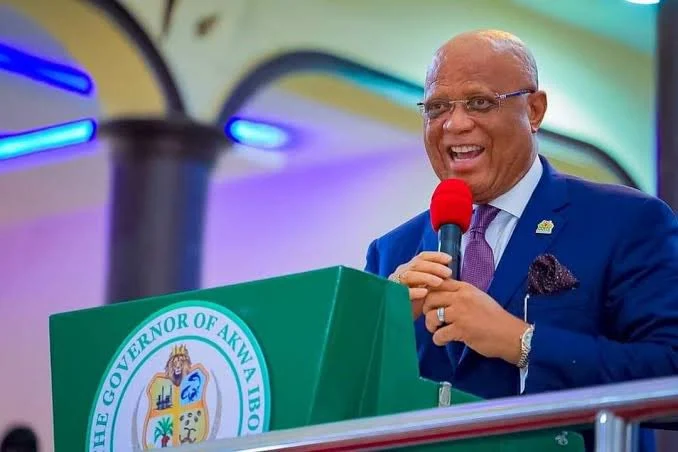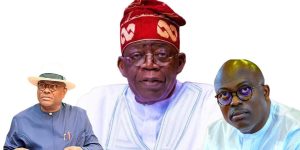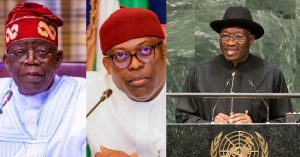I Love PDP, But It’s Time to Progressively Move”: Governor Umo Eno and the Politics of Silent Defection
The Nigerian political theatre has always been a fluid canvas of allegiances, defections, and dramatic ideological pivots. In a recent political overture that has sent ripples across the South-South and beyond, Governor Umo Eno of Akwa Ibom State dropped what many now consider an unmistakable hint at defecting from the Peoples Democratic Party (PDP). Speaking during a state banquet on May 29, 2025, to mark his second year in office, Governor Eno’s words were measured yet loaded with unmistakable intent:
“I respect our party, the PDP. I love the PDP. But we all know the way things are… So, whatever happens, wherever the journey of life takes me, I will always love you.”
While he stopped short of directly naming a new political destination, the prevailing winds suggest a gradual but strategic alignment with the All Progressives Congress (APC), Nigeria’s ruling party. This move, if officially confirmed, could have significant ramifications not just for Akwa Ibom but for the PDP’s dwindling influence nationally and the realignment of political loyalties in the build-up to the 2027 general elections.
Before delving into the unfolding political drama, it’s essential to understand the man at the center of it all. Umo Bassey Eno, a pastor, entrepreneur, and public administrator, emerged as a surprising political figure when he was elected governor of Akwa Ibom in 2023 under the PDP banner. His ascendancy was heavily supported by then-governor Udom Emmanuel, who handpicked him as a successor, bypassing several established political heavyweights.
YOU MAY READ
PDP Crisis Reaches Boiling Point as Wike’s Camp Moves to Oust Atiku’s Loyalists
Many saw Eno’s rise as the continuation of Emmanuel’s legacy—a softer, development-focused approach to governance centered around industrialization, entrepreneurship, and religious values. However, his relatively non-combative and bipartisan style has led to both criticism and praise. He has made it clear that, for him, governance trumps politics. But in Nigeria, separating the two is nearly impossible.
The banquet to celebrate Eno’s two years in office was more than a ceremonial event. It became a coded declaration of independence—a clear sign that the governor was preparing to redefine his political identity.
“It’s time to progressively move… That again will not affect anything in this state. We do not govern based on political affiliations,” he said.
This statement was pregnant with implication. The phrase “progressively move” echoed with a dual meaning: a generic desire for development and a political dog whistle referencing the APC’s “progressive” ideology. For seasoned political observers, this wasn’t a coincidence—it was a deliberate rhetorical shift, a gentle but firm push away from the PDP’s embrace.
Governor Eno’s political body language has become increasingly telling. Though still technically in the PDP, he has maintained warm relations with top APC figures, most notably:
- President Bola Ahmed Tinubu: Eno has made multiple visits to the Presidential Villa and has spoken favorably about Tinubu’s leadership style, fiscal reforms, and federal inclusiveness.
- Senate President Godswill Akpabio: Akpabio, a former governor of Akwa Ibom turned APC chieftain, shares a complex relationship with Eno. In recent months, they’ve been seen more often at state functions and joint federal-state projects, signaling thawed relations and emerging cooperation.
- National APC Events: Though not officially part of the APC, Eno has been spotted at several APC-led national development initiatives and policy summits—moves that are usually precursors to formal party crossovers.
These moves are not accidental. They form part of a broader strategy: to test public sentiment, gauge intra-party resistance, and prepare stakeholders before making the leap.
For the PDP, Eno’s potential defection is more than symbolic; it represents the continuing erosion of the party’s stronghold in the South-South region. Once a bastion of PDP dominance, the zone is gradually leaning toward the APC due to federal-level patronage, realignments, and the appeal of power proximity.
PDP stalwarts in Akwa Ibom have so far remained silent, likely adopting a wait-and-see approach. Some may be negotiating behind the scenes to prevent Eno’s departure, while others are preparing for a political divorce. Either way, the silence is deafening—and telling.
The PDP, struggling with internal factionalism, unresolved leadership crises, and electoral defeats in recent years, risks losing more ground if it cannot hold onto its governors. Eno’s departure could be the tipping point, especially if other governors or political blocs follow suit.
- Access to Federal Resources:
Aligning with the ruling APC provides strategic advantages in terms of federal support, project approvals, and budgetary cooperation. In a post-oil Nigeria, governors are eager to partner with the center for infrastructure and economic development. - 2027 Political Ambitions:
As speculation around 2027 intensifies, aligning with APC might secure federal protection or a larger political role beyond the governorship. Whether it’s a vice-presidential bid or a ministerial slot, defecting now sets the stage early. - Consolidation of Local Power:
By aligning with Akpabio—one of Akwa Ibom’s most influential political figures—Eno could neutralize internal opposition and build a broader, more stable support base. - Avoiding PDP Implosion:
Given the PDP’s continued internal crises—legal tussles, lack of central leadership, and unclear zoning arrangements—staying may be more politically dangerous than leaving.
However, crossing over to the APC isn’t without consequences:
- Grassroots Backlash: PDP has deep roots in Akwa Ibom. Local leaders, especially at the ward and LG levels, may feel betrayed. Mass defection from lower structures may not follow immediately, leaving Eno politically exposed.
- Perception of Opportunism: Critics may accuse Eno of lacking ideological conviction, aligning only where the benefits lie. This could dent his credibility, especially among young voters.
- Intra-APC Resistance: Not everyone in APC may welcome him. Power brokers who fought the PDP may resent Eno’s entry, especially if he’s seen as a competitor for federal appointments or party structures.
The upcoming 2027 general elections will be fiercely contested. The APC is already positioning itself for another term, while opposition parties struggle to form a united front. In this context, every governor who defects to the APC strengthens its electoral machinery and narrative of dominance.
Eno’s movement could:
- Trigger a Wave of Southern Defections: Particularly from states with marginal PDP dominance, where governors are disillusioned with the party’s direction.
- Weaken PDP’s Negotiating Power: In national coalitions or alliances, fewer governors mean less influence.
- Help APC Penetrate the Christian South: Eno, being a pastor and a symbol of Christian leadership in the South, could help APC improve its religious image in regions where it’s often viewed with suspicion.
One of the most remarkable aspects of Eno’s transition is his masterful use of political language. Phrases like:
- “I love the PDP”
- “We must progressively move”
- “Wherever life takes me”
—are ambiguous enough to maintain plausible deniability but clear enough to send signals to allies and opponents alike.
This “soft exit” strategy is increasingly popular among politicians who wish to avoid the backlash of abrupt defections. It allows time for stakeholder consultation, grassroots management, and structural alignment before the official announcement.
In Nigeria’s Fourth Republic, political parties have often served as vehicles for access to power, rather than ideological institutions. Party switching is commonplace, often with little or no consequence. The 2015, 2019, and 2023 elections saw major figures—including sitting governors, Senate Presidents, and former ministers—defecting weeks before primaries or general elections.
What makes Eno’s case different is the timing and subtlety. He is not defecting in desperation but as a sitting governor with stable approval ratings. This shifts the defection narrative from one of survival to one of strategy.
Governor Umo Eno’s recent statements and political behavior indicate a shift that’s more than rhetorical. While no formal defection has been announced, the writing is on the wall. His gradual realignment with APC heavyweights and open-ended statements suggest a deliberate, phased exit from the PDP.
What happens next may depend on how the PDP responds—whether through internal reconciliation, strategic engagement, or by preparing to absorb the loss and rebuild. For the APC, it’s another victory in the South and another step toward consolidating national dominance.
For Eno, the road ahead is risky but promising. If he successfully transitions without alienating his base, he may emerge as a new power center in Southern Nigeria—one with influence that stretches beyond the Niger Delta and into the very heart of national politics.
And for Nigerians, it’s a familiar but still important reminder: in the world of Nigerian politics, today’s loyalist can be tomorrow’s defector, and the only constant is change.





